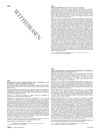 1 citations,
March 2023 in “Science Translational Medicine”
1 citations,
March 2023 in “Science Translational Medicine” Blocking a certain signal in the gp130 receptor can improve tissue healing and lessen osteoarthritis symptoms.
 1 citations,
August 2022 in “Biomedicines”
1 citations,
August 2022 in “Biomedicines” Dutasteride, usually used for prostate issues and hair loss, could potentially treat Amyotrophic Lateral Sclerosis (ALS) due to its neuroprotective, antioxidant, and anti-inflammatory properties, but more testing is needed.
1 citations,
August 2022 in “Frontiers in Medicine” ALRV5XR effectively promotes hair regrowth in both men and women through different mechanisms.
[object Object] 1 citations,
June 2018 in “Open Access Macedonian Journal of Medical Sciences” Recycling hair from past transplants can improve hair density and patient satisfaction.
 1 citations,
December 2015 in “International journal of pediatric research”
1 citations,
December 2015 in “International journal of pediatric research” Hair tourniquets on the clitoris are rare but can cause serious harm and should be removed quickly.
 September 2024 in “Advanced Biomedical Research”
September 2024 in “Advanced Biomedical Research” Auriculotherapy and Aslagh capsules are as effective as metformin for treating PCOS symptoms, with auriculotherapy slightly better for reducing hair growth.
 April 2024 in “Animal models and experimental medicine”
April 2024 in “Animal models and experimental medicine” PRP treatment helps hair growth and rebalances scalp bacteria in androgenetic alopecia patients.
[object Object]  March 2024 in “EMBO molecular medicine”
March 2024 in “EMBO molecular medicine” Antiviral drugs, especially daclatasvir, may be a new treatment for a rare skin disease, improving survival and reducing symptoms in mice.
 January 2024 in “Pediatric rheumatology online journal”
January 2024 in “Pediatric rheumatology online journal” Early genetic testing and JAK inhibitors can help treat systemic inflammation in SAVI patients.
 January 2024 in “Case Reports in Dermatological Medicine”
January 2024 in “Case Reports in Dermatological Medicine” Baricitinib may effectively treat nail changes in alopecia areata.
November 2023 in “IntechOpen eBooks” Arsenic exposure from contaminated water severely damages the skin, causing hair loss, pigmentation changes, irritation, and can lead to skin cancer.
 October 2023 in “Psychiatry research. Case reports”
October 2023 in “Psychiatry research. Case reports” A new HRAS gene variant may cause a range of symptoms including intellectual disability and psychiatric issues.
September 2023 in “Ukraïnsʹkij žurnal Perinatologìâ ì pedìatrìâ” Quick action and prevention are crucial to avoid severe complications from tourniquet syndrome in children.

Cold-pressed rapeseed oil is most resistant to oxidation and certain oils may reduce chronic disease risk; consumers like the taste of pumpkin oil best.
May 2023 in “Clinical and translational neuroscience” Tailored neurorehabilitation programs improve life quality for post-COVID-19 patients.
 April 2023 in “JMIR Research Protocols”
April 2023 in “JMIR Research Protocols” The study aims to create a model to predict health attributes using diverse health data from Japanese adults.
 February 2023 in “Vaccines”
February 2023 in “Vaccines” COVID-19 may harm male reproductive health and lower testosterone levels, potentially affecting fertility and causing erectile dysfunction. More research is needed.
 January 2023 in “Burns & Trauma”
January 2023 in “Burns & Trauma” The study concluded that the new wound model can be used to evaluate skin regeneration and nerve growth.
 November 2022 in “Scientific Reports”
November 2022 in “Scientific Reports” Certain ESR1 gene variations may affect hormone levels and fat distribution in women with high male hormone levels.

Lhx2 is a crucial regulator of the Sonic Hedgehog signaling in early mouse retinal development.
 September 2022 in “Plastic and Reconstructive Surgery”
September 2022 in “Plastic and Reconstructive Surgery” Baricitinib helps with severe hair loss, negative-pressure therapy lowers hernia recurrence, tranexamic acid reduces bleeding, robot-assisted breast surgery may improve outcomes, and acellular dermal matrix could decrease breast reconstruction complications.
 August 2022 in “Archives of pediatric surgery”
August 2022 in “Archives of pediatric surgery” Hair-Thread Tourniquet Syndrome is a rare condition where hair or thread tightly wraps around a child's body part, requiring quick treatment to prevent damage.
 July 2022 in “Biomedicines”
July 2022 in “Biomedicines” 4-Aminopyridine improves skin wound healing and tissue regeneration by increasing cell growth and promoting nerve repair.
 October 2020 in “Проблемы эндокринологии”
October 2020 in “Проблемы эндокринологии” Men with higher androgen levels may have severe COVID-19 symptoms, but those on antiandrogen therapy are less likely to contract the virus and have milder symptoms. Anti-androgen drugs could potentially treat COVID-19, but more research is needed.
 February 2019 in “Obstetrics and gynaecology cases - reviews”
February 2019 in “Obstetrics and gynaecology cases - reviews” Women with excessive hair growth tend to have shorter index and ring fingers compared to others.
 January 2012 in “Modern Plastic Surgery”
January 2012 in “Modern Plastic Surgery” Toe Tourniquet Syndrome is often misdiagnosed.
September 2022 in “International Journal of Impotence Research” Public interest in finasteride's sexual side effects has significantly increased.
48 citations,
January 2008 in “European Neurology” Thallium poisoning causes pain, hair loss, and nerve issues, treatable with hemoperfusion and hemodialysis.
 18 citations,
March 2004 in “Clinics in Dermatology”
18 citations,
March 2004 in “Clinics in Dermatology” Lupus can cause hair loss and nail changes, with treatments available for both.
 2 citations,
April 2016 in “Journal of The American Academy of Dermatology”
2 citations,
April 2016 in “Journal of The American Academy of Dermatology” Dutasteride more effective than finasteride for hair growth; SM04554 safe and potentially effective for hair loss.























